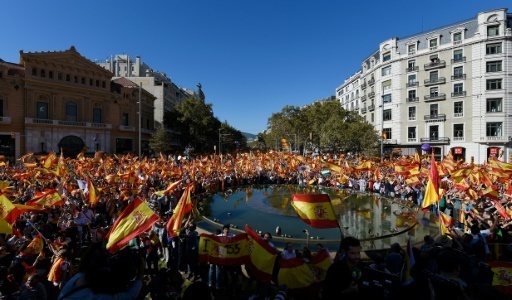What is going to happen in Catalonia, a Spanish territory as big as Belgium, whose Parliament declared Friday independence, before being placed under direct supervision by the State? Is the break real or imaginary?
The answers will depend on the level of resistance of the separatist leaders and their supporters among the Catalans. But also partisan interests, sharpened by the convening of regional elections by the head of the conservative government Mariano Rajoy, December 21.
Is the ‘Republic’ already running out?
The Catalan separatist president deposed by Madrid, Carles Puigdemont, and his number two, Oriol Junqueras, did not seem to want to accept their dismissal. But they were to subscribers absent Monday, the first having left for Brussels without specifying the reasons for this trip.
Meanwhile, nothing in Barcelona seemed to have changed, or almost: the Spanish flag still floated on the buildings of the state and the website of the Catalan executive still showed the photos of the “advisers” (ministers) dismissed.
The government has taken over for the moment the Mossos d’Esquadra (Catalan police) who have agreed to no longer ensure the close protection of some members of the Catalan government.
“It is obvious that the new Catalan republic has much less strength than Madrid,” admits Carles Puigdemont’s lawyer, Jaume Alonso-Cuevillas.
The members of the dismissed government risk prosecution for public “disobedience” and “embezzlement”, “sedition” and “rebellion” and some advisers were no longer working Monday, not to expose themselves.
What resistance?
The powerful independentist associations, which can mobilize hundreds of thousands of people, have been unobtrusive for several days, such as the “Committees for the Defense of the Republic”, these associations from neighborhoods that had organized the defense of polling stations in the referendum. self-determination banned from October 1st.
“If there is resistance, it will be passive and low cost +”, believes political scientist Pablo Simon in Madrid, considering that the approximately 200,000 Catalan civil servants will not take the risk of suffering sanctions.
“It may be that they drag their feet in the execution of their task but ultimately it does not matter because we are facing an interim government, management of current affairs before the elections” of December 21, declares -he.
Carles Puigdemont “always said that politicians should assume but without exposing officials,” says his lawyer.
Elections, Rajoy’s master stroke
His opponents concede: the fact of calling elections very quickly was “smart” from Mariano Rajoy.
To avoid getting bogged down in the “Vietnam” promised by the radical separatists, he played the card of democracy, while the placing under guardianship of Catalonia was perceived as a reminder of the dictatorship of Francisco Franco (1939- 1975) that would have welded separatists against him and perhaps expanded their support in Catalonia.
It has also imposed its timing on pro-independence parties – from the right to the far left – that have been sidelined for several months.
After the election call, they face a tough choice: to continue the flight by refusing to participate in the 21 December vote, or to take part in the elections and accept to play the game of the state.
The party of Mr. Puigdemont jumped on Monday, announcing his participation. And Sergi Sabria, deputy of the main independentist party (ERC, Republican Left of Catalonia), announced that he would find “the means to participate”, after admitting, very moved, that “the republic does not have the full capacity of win. ” The far-left CUP party did not close the door to participation.
Mariano Rajoy “played very well,” said political scientist Sandra Leon of York University in the UK. “The election scenario is not a resistance scenario,” she says, “people are confused”. If separatists do not manage to present themselves in coalition, which is likely, “they will be in a logic of competition”, not favorable to the resistance.
And the Catalans in all this? “It remains the division … It will require dialogue, a lot of dialogue … because behind the clash between Barcelona and Madrid we had forgotten the internal disagreement with Catalonia,” she said.






























